- Home
- Jacob Peppers
The Truth of Shadows
The Truth of Shadows Read online
Contents
Dedication
Newsletter Signup
Chapter One
Chapter Two
Chapter Three
Chapter Four
Chapter Five
Chapter Six
Chapter Seven
Chapter Eight
Chapter Nine
Chapter Ten
Chapter Eleven
Chapter Twelve
Chapter Thirteen
Chapter Fourteen
Chapter Fifteen
Chapter Sixteen
Chapter Seventeen
Chapter Eighteen
Chapter Nineteen
Chapter Twenty
Chapter Twenty-One
Chapter Twenty-Two
Chapter Twenty-Three
Chapter Twenty-Four
Chapter Twenty-Five
Chapter Twenty-Six
Chapter Twenty-Seven
Chapter Twenty-Eight
Chapter Twenty-Nine
Chapter Thirty
Chapter Thirty-One
Chapter Thirty-Two
Drop me a line!
Newsletter Signup
About the Author
Note from the Author
This book is a work of fiction. Names, characters, places and incidents are either the product of the author’s imagination or are used fictitiously. Any resemblance to actual persons, living or dead, or to actual events or locales is entirely coincidental.
The Truth of Shadows: Book Two of The Nightfall Wars
This ebook is licensed for your personal enjoyment only. This ebook may not be re-sold or given away to other people. If you would like to share this book with another person, please purchase an additional copy for each person you share it with. If you’re reading this book and did not purchase it, or it was not purchased for your use only, then you should return to the retailer and purchase your own copy. Thank you for respecting the hard work of the author.
Copyright © 2019 Jacob Nathaniel Peppers. All rights reserved, including the right to reproduce this book, or portions thereof, in any form. No part of this text may be reproduced, transmitted, downloaded, decompiled, reverse engineered, or stored in or introduced into any information storage and retrieval system, in any form or by any means, whether electronic or mechanical without the express written permission of the author. The scanning, uploading, and distribution of this book via the Internet or via any other means without the permission of the publisher is illegal and punishable by law. Please purchase only authorized electronic editions, and do not participate in or encourage electronic piracy of copyrighted materials.
The publisher does not have any control over and does not assume any responsibility for author or third-party websites or their content.
Visit the author website: http://www.jacobpeppersauthor.com
This is to you, Dear Reader,
The curtains are drawn,
The lights are dimmed,
I hope you enjoy the show!
Sign up for my mailing list to hear about new releases and promotions as well as get a FREE copy of The Silent Blade, the prequel book to the bestselling series, The Seven Virtues.
Click here to get your FREE book now!
Chapter One
The shadows were everywhere, and there was nowhere to hide, nowhere to run. Yet, run Sevrin did, his breath rasping in his throat, his skin on fire from dozens of scrapes and cuts the undergrowth had given him as he forced his frantic way through the forest. There was a fresh bruise on his cheek from where he’d run headlong into a tree limb he didn’t see in the darkness, nearly knocking himself unconscious. Yet, all of these pains were small, insignificant next to the terror that gripped him, the terror that left him bathed in a cold sweat, that sent choked whimpers issuing from his throat out into the night.
Never go into the darkness without a light.
It was a warning he’d heard since he was a child, sitting in his father’s study, one oft-repeated, the man’s voice somehow contriving to always be disapproving, disappointed even while giving his child what most would have considered a protective warning. But Lord Aldrick was not a man known for his compassion or his mercy. He was instead a man renown for the significant wealth he had accumulated during his lifetime. Wealth sometimes—more often than not, if Sevrin was being honest with himself—gained at the expense of the many partners he had found and then discarded when it suited him.
Sevrin hated his father, hated, too, the man’s need to constantly give unwanted orders poorly disguised as advice, but in that, at least, he had not been wrong. Never go in to the darkness without a light. Even a fool knew as much. Yet, here he was, the night gathering around him, suffocatingly close. He considered—not for the first time since his desperate flight had begun—running back to the fires, where Eriondrian and his new companions waited, but he dismissed the thought.
Eriondrian would kill him or have the Ferinan savage do it for him. He had always hated Sevrin, and this would be the perfect opportunity for the snide bastard to get rid of Sevrin without any consequence. No, he would not, could not put himself into the lesser man’s power. And that wasn’t even the worst of it. What of the other, the one who had made fire itself obey his commands, whose face had twisted with rage even as he fought and killed creatures that many scholars believed unkillable? No. Better to run. He was close to the city, he knew. How much longer until he was safe? A mile? Two?
I can make it. And when I return, I will marshal the city’s troops, will speak to Chosen Tesharna herself to let her know that her captain, this Palen Far, failed. The Chosen would be grateful, of course, and it wasn’t beyond the realm of possibility to believe that she would reward Sevrin’s loyalty with a place in the city’s rule. After all, someone would have to take over the Redeemers, and why not he? In doing so, Sevrin would become more powerful even than his father, and no longer would he have to suffer the man’s disgust or listen to his constant lectures and recriminations.
The thought was so enticing, so all-consuming that for a moment Sevrin forgot where he was, forgot in his hopes, the danger he found himself in. At least, that was, until his foot caught on a tree root that was invisible in the darkness. He screamed as he lost his balance, and his panicked flight turned into a roll as he tumbled down the hillside.
He cried out as he rolled over rocks and fallen limbs, struggling and failing to halt his forward momentum until, finally, his desperate progress took him into the trunk of a tree, and his scream turned into a pained wheeze as the breath exploded from his lungs. He felt his rib crack, but even that excruciating pain felt distant. He’d hit his head at some point during his fall, and shadows crept along the corners of his vision, a fog settling over his thoughts.
He did not know how long he lay there, on the forest floor, was not even aware that he was lying there at all until something touched his forehead. Something wet and fleshy. “Go away,” he groaned, his eyes squeezed shut against the pain of his cracked rib.
The thing—whatever it was—pulled away. But a moment later it was there again, cool wetness on his bruised flesh. “Damnit, I said leave me alone, you damned mutt.” One of his father’s dogs, had to be. The bastards were always roaming around, strutting in their arrogant way that said they knew, just as Sevrin did, that their master, Sevrin’s father, held more love for them than he ever would his son. Nothing but the finest for those mutts, and more than once as a child, Sevrin had woken from his bed to find one of the hounds sniffing him as if it was considering him for its next meal.
Once, when he had been no more than eight or nine years grown, he had woken on such an occasion to find one of them—his father’s favorite at the time—tugging at his blankets, meaning to take th
em for himself. As if possessing a greater portion of his father’s love than Sevrin had ever had was not enough, as if it was not enough that the old man paid to have them groomed and trained and fed only the finest foods. In its greediness, it wanted to take what little Sevrin had, his blanket, and even at such a young age, Sevrin had seen the truth of the thing, the audacity of it.
So, barely awake, he smacked the beast on the snout, maybe a little harder than normal, but in that strike was not just his anger at the current injustice, but at a lifetime led under the tyrannical rule of his father’s whims, his father’s looks of shame and disappointment. The beast answered by locking its sharp teeth along the boy’s thigh, and Sevrin screamed then. Oh, how he screamed. But the beast only sat there, its dumb eyes studying him as blood leaked out between its fangs—it did not move, did not savage the flesh in its mouth. Instead, it only watched him with something like malicious glee in its eyes while the boy screamed and pleaded, begged and hated.
In the end, it took three of his father’s guardsman half an hour to convince the beast to let loose its hold without, of course, daring to hurt it, for they knew well how much Lord Aldrick cared for his animals. They knew also that he was not a man with mercy or who might show understanding when he felt that he had been wronged.
In that moment, even through his pain, Sevrin loathed his father, despised him with a hate so intense that it rose as a counterpoint to the pain itself, for even these guards knew that when it came to their lord’s son and his animals, the boy did not stand higher in his father’s regard. By the time the guards finished removing the beast’s fangs, his father had arrived, and as he moved to his son’s bed, it was not worry or compassion in his eyes, but anger. Disappointment. Weeping in pain and fear and hurt, Sevrin told his father what happened.
Lord Aldrick listened, his face an expressionless mask, until the boy was done. Then, “Stop your crying,” he said. “For what pain you feel you have brought on yourself. You chose the battle, boy, and you lost. Do not weep for the pain—if anything, weep for your own failure, for even an animal has bested you.”
Sevrin was too shocked then to answer, was still struggling with understanding not just his father’s words, but the disdainful regard with which they’d been said, when Lord Aldrick stood and turned to the three guards still standing in the bed chamber, their expressions carefully controlled. “Take his blankets. Give them to the dogs.”
The guards hesitated, shock in their eyes, but only for a moment. They had long since grown accustomed to their lord’s expectations of immediate obedience. The bed linens were stripped from Sevrin’s bed in moments, and carried away. When the guards were gone, Lord Aldrick called the dog to him—the beast had been sitting by the bed, its crimson tongue lolling, dripping blood, Sevrin’s blood, unto the floor. “Clean this up,” he told his son, then turned to leave. He paused when Sevrin spoke.
“F-father, I hurt. My leg…”
“I will send a healer,” his father said, studying the bloody leg with disgust. “And yes, you hurt. You will be cold in the nights to come, boy, and you will hurt. But failure is often cold, and it always hurts.” With that, he left, leading his favored dog with him. The following day, Sevrin had woken to the ungentle proddings of the Ekirani blademaster, and he had been forced to begin his training despite the wound in his leg.
Suddenly, the dog’s prodding became more forceful, pushing Sevrin onto his side, and with a grunt of frustration, he opened his eyes, his anger, fully woken by the memory, overriding even the pain of his broken rib and battered body. The torch he’d carried lay on the forest floor a few feet away, sputtering dangerously, and some small part of his mind that remained outside the anger had a panicked thought. What if it goes out? A single torch was a thin barrier against the night and the things that waited in it, but thin was better than none at all.
Another abrupt push from the dog, even more forceful than the last, so forceful, in fact, that Sevrin cried out in surprise. “Get away you, you da—” He cut off as his eyes fell on the beast, barely illuminated by the torch’s weak glow. About the size of a dog, but when it growled—a deep, rumbling vibration from the back of its throat—and raised its head, opening its mouth to reveal its sharp teeth, Sevrin felt his skin go cold in shock. Not a dog, not this. Eyes that glowed a lambent, sickly green in the near-darkness, fangs far too cruel and sharp with something—even in his shock, Sevrin’s stomach churned dangerously as he realized it was a piece of flesh—stuck in between them. Not a dog. A nightling.
An image flashed through Sevrin’s mind, an image of those impossibly long fangs lashing onto his arm. Or his leg. Unlike his father’s hound so many years ago, this beast, he knew, would not stop there, would not stop until Sevrin’s leg, and the rest of him, was torn apart, ripped to pieces, with nothing left to show he’d been there at all but a bloody patch on the ground, quickly washed away by the rain.
Finally, Sevrin overcame enough of his shock to scream. As if it had been waiting for just such a cue, the beast lunged at him, its teeth leading, but whatever else his father—and the Ekirani blademaster who’d served as Sevrin’s combat tutor—had been, they had at least been thorough. His body reacted before his mind had fully processed what was happening. He flung himself to the side even as his left arm flew out, hitting the beast in the snout. Not a blow meant to hurt, but to deflect, and the beast’s lethal fangs snapped shut inches from Sevrin’s side, as he rolled away and came to his feet.
It turned then, regarding him with dumb, animalistic hate in its eyes. His own gaze never leaving it, Sevrin reached to his side, where he always carried his sword—another order by the Ekirani blademaster who’d said that a warrior without a weapon was not a warrior at all. To Sevrin’s surprise and relief, the blade was still there. He had half-expected that, in his roll down the hill, it would have been knocked free, and as soon as his hands closed around the hilt, he drew it from its scabbard and felt better. Stronger.
“Come on then, you beast,” he growled. “I am not a child any longer.”
The creature’s jaws spread impossibly wide as it revealed its deadly teeth in what might have been a grin. Then it charged toward him on all fours, its black scaly flesh little more than a blur in the torchlight. Sevrin leapt to the side, narrowly avoiding the beast’s charge, and swung his blade, two-handed, at the beast’s back, meaning to sever its spine.
But the nightling was faster than he’d thought, and his strike hit nothing but air as it hurtled past him. It growled then, and he’d just managed to turn to face it when it leapt through the air, its talons coming straight for him. With a grimace of anger and fear, Sevrin took a step back, planting his foot, and setting his blade in the way of the creature’s body.
In the air as it was, there was no way for it to turn, no way for it to avoid impaling itself on the blade, and Sevrin felt a flash of satisfaction as the steel dug deep into the ebony flesh. A satisfaction that vanished a moment later as the creature’s weight—far greater than any hound or anything its size should be—carried it forward all the way to the sword’s hilt and then into Sevrin himself, knocking him from his feet.
The two sprawled on the ground, and the handle of his sword was torn from Sevrin’s grip by the impact. He rolled on instinct, narrowly avoiding the beast’s raking claws that dug furrows into the damp grass, and when he gained his feet he saw that the creature had risen also. The blade still protruded from its back, and black ichor leaked from the wound. But it was the creature’s eyes that drew Sevrin’s attention. There was pain in that gaze, yes, but more than anything there was an unbridled hatred, a rage that made Sevrin’s throat go dry.
The beast circled him slowly, the steel shifting in its chest as it did, its head turned, watching him. A warrior without a weapon is no warrior at all. The blademaster’s words rang through Sevrin’s mind, and in that moment he hated the man. Hated him and, at the same time, knew that he’d been right.
Whatever strength he’d gained, whatever confid
ence he’d felt when his hand had grasped the blade’s handle had vanished as soon as it was torn from his grip. Now, he felt weak, afraid, and the aches and pains of his body were growing by the second.
He risked a glance to his right where the torch lay nearby. A weapon, for all knew that the nightlings could not abide the touch of light or fire on their skin. He looked back to the beast to see that it had stopped its pacing and was now studying him. It glanced once at the torch then back to him, its mouth spreading wider as if it knew his thoughts and was amused by them.
“Stupid beast,” Sevrin hissed. “You know nothing!” Then he sprang for the torch. He was halfway there when the creature plowed into him from the side with shocking force, and he was sent flying into the trunk of a nearby tree. He would have fallen, but the beast was on him in another moment, its talons digging into his chest and pressing him back against the tree as its fangs sought to find his throat.
Sevrin fought against it, but despite its smaller size, the creature was incredibly strong, and though he managed to keep the first snap of its jaws away from his tender neck, he could not push it off completely. Only a matter of time then, before the creature managed to clamp its fangs around his neck, and it wouldn’t be long, he knew. After all, Sevrin could feel his strength bleeding out of him as the beast’s claws continued to dig into his chest.
Desperate, he pulled back one of his hands that had been trying, ineffectually, to rip the creature’s foreleg away, and drove the thumb of it into the creature’s glowing, malevolent eye. The nightling screeched in pain and recoiled, but as it did one of its claws swiped out, raking across Sevrin’s face. Sevrin gasped at the shocking pain and stumbled away, screaming.
He collapsed to his knees, his cheek and forehead burning with agony where the creature’s claw had scored him. Oh gods, not my face. Not my face. Even as a child, Sevrin had been handsome, and he had only become more so as an adult. His father had his money, his men, and Sevrin had his looks. Some had called him vain—though in whispers when they thought he could not hear—and perhaps they had even been right. But his appearance had been his own source of power, the only one which did not derive from his father but was wholly his own. And they had served him well, so well that he had not even minded those whispers. After all, a man used what weapons he had.

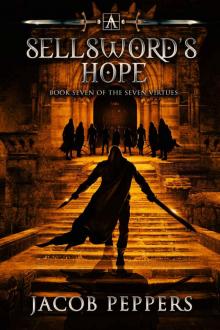 A Sellsword's Hope
A Sellsword's Hope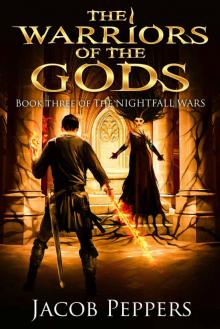 The Warriors of the Gods
The Warriors of the Gods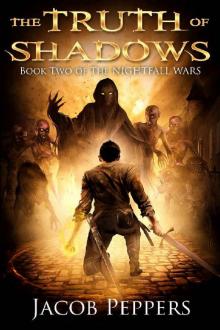 The Truth of Shadows
The Truth of Shadows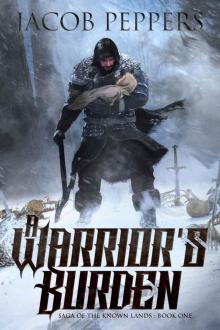 A Warrior's Burden: Book One of Saga of the Known Lands
A Warrior's Burden: Book One of Saga of the Known Lands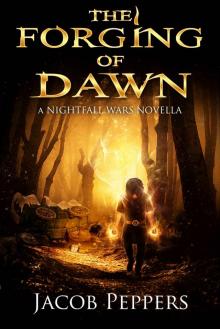 The Forging of Dawn
The Forging of Dawn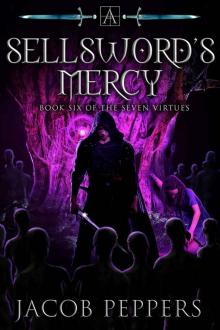 A Sellsword's Mercy
A Sellsword's Mercy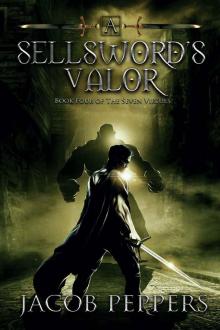 A Sellsword's Valor
A Sellsword's Valor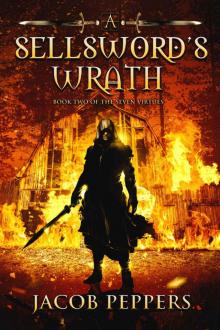 A Sellsword's Wrath
A Sellsword's Wrath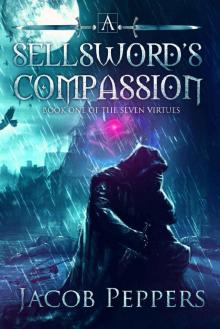 A Sellsword's Compassion_Book One of the Seven Virtues
A Sellsword's Compassion_Book One of the Seven Virtues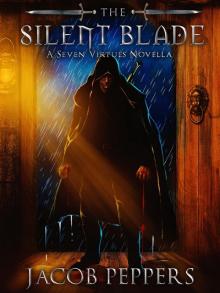 The Silent Blade: A Seven Virtues Novella
The Silent Blade: A Seven Virtues Novella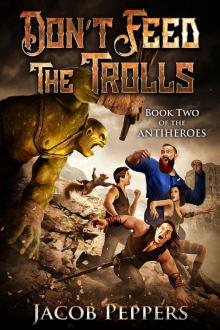 Don't Feed the Trolls
Don't Feed the Trolls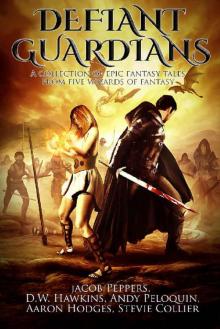 Defiant Guardians Anthology
Defiant Guardians Anthology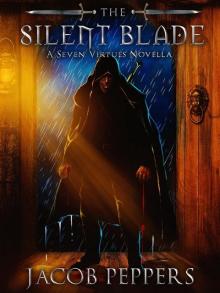 The Silent Blade
The Silent Blade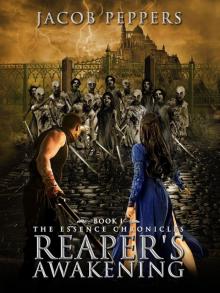 Reaper's Awakening
Reaper's Awakening